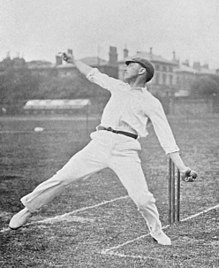Hedley Verity
When Wilfred Rhodes, the incumbent Yorkshire left-arm spinner, announced his retirement, Verity had a successful trial in the team in 1930, and led the national bowling averages.
He established himself as part of a strong bowling unit, which helped Yorkshire win the County Championship seven times in his ten seasons with the club.
[4] Verity left school aged 14 to work for his father, who had established a coal business in Guiseley,[5] and played cricket for Rawdon's second team.
[8] In 1921, Verity made his debut for Rawdon in league cricket; some of his subsequent performances attracted the notice of the local press, and he took 29 wickets at an average of 13.80 that season.
[9] Meanwhile, critics in Rawdon began to see increased potential in his batting, which improved steadily; by 1924, the Yorkshire Evening Post described Verity as "one of the most promising cricketers in the Leeds district".
[16] Even so, the club were prepared to offer an improved contract for 1928, but he declined as Accrington had previously refused to release their players for county cricket.
[19] With the support of the Middleton team and committee, Verity started bowling spin at the beginning of the 1929 season and immediately began to attract attention from counties, culminating in an unsuccessful nets trial for Warwickshire.
[23] Cricket historian Derek Hodgson notes that Verity's years in the Lancashire Leagues "meant that he reached Yorkshire ... as a hardened and experienced performer".
[27] Rhodes and Emmott Robinson, the senior professionals in the Yorkshire team, discussed tactics with Verity and his friend and teammate Bill Bowes, to analyse their errors.
[58][59] Selected for the first Test on the strength of his early tour performances, Verity bowled just 17 overs in the game, mainly being used to give the fast bowlers a rest.
Rain before the beginning of the third day affected the pitch; Bradman, possibly irritated by a minor show of bravado from Verity, scored 71 in conditions which should have been perfect for the Yorkshireman, who took only two wickets.
In their first innings, England had lost eight wickets, and were still 76 runs behind Australia's score when Verity joined Paynter, who had left a hospital bed where he had been confined with tonsillitis.
[72] Australia were bowled out in their second innings and Verity took two wickets; England scored the required runs to record a six-wicket win which ensured victory in the series—and the Ashes.
[81] Verity represented the Players against the Gentlemen and played in the first two of three Tests against the West Indies, taking four for 45 in the first match and capturing seven wickets at an average of 21.85 in the series.
"[97] Historian David Frith writes that Verity was "probably the cricketer [Jardine] admired above all others",[95] while Bob Wyatt believed the two men were very similar in outlook, temperament and desire to succeed.
The tourists just failed to score enough runs to make England bat again and were forced to follow on:[99] Cardus wrote: "Verity settled the issue like a great bowler".
The majority of them had had no experience in England of such a pitch, and they showed no ability or skill in dealing with bowling like that of Verity under these conditions; their efforts at playing back were, to say the least, immature.
"[99] Afterwards, this game became known in cricket circles as "Verity's match";[102] it was the only occasion in the 20th century when England beat Australia at Lord's,[104] and their last such win for 75 years.
[105] The third match was played on a very good pitch for batting in extremely hot weather,[106] and England did not have a strong bowling attack in the view of Wisden.
[110] Cardus, assessing the English bowling, regretted that England did not have a bowler capable of flighting the ball, a role usually performed by left-arm spinners.
[77][82] Reviewing the series, Wisden editor Sydney Southerton wrote, "Verity, apart from his one amazing performance at Lord's, could be complimented upon his steadiness rather than upon his effectiveness on hard wickets".
[120] The Times correspondent wrote: "Verity has not been impressive on firm wickets: he seems to have checked suddenly in a career which promised so well three seasons ago, and it is not surprising that he has been left out of this side.
[30] The Wisden report on the tour said: "Verity admirably performed the task of keeping one end closed and took high honours for his consistently good work.
[144] After the third match was abandoned owing to rain, Australia won the fourth Test, held at Headingley, by five wickets to ensure the Ashes were retained.
"[147] Barnett also said that Hammond refused to allow Verity to alter his bowling tactics, when the Yorkshire bowler wished to aim for a worn area on the pitch.
Hutton commented: "I owe [Verity] the kind of debt that one can never fully repay ... His quiet, natural dignity was an immense source of strength to me throughout those long hours".
In the second innings, Verity took seven wickets for nine runs on a rain-affected pitch to bowl Sussex out for 33 and take Yorkshire to a win, although the match was played in a strained, tense atmosphere.
[165] His most effective delivery curved through the air, pitched on middle and leg stump and spun away from the batsman, causing many of them to edge the ball into the slips.
[196] Bradman wrote in an obituary: "I cannot ever recall hearing Verity utter a word of complaint or criticism ... if reports of his final sacrifice be correct ... he maintained this example right to the end.
"[197] When first-class cricket resumed in 1945, Yorkshire staged a memorial match for Verity against Lancashire at Bradford Park Avenue, which resulted in a draw.






